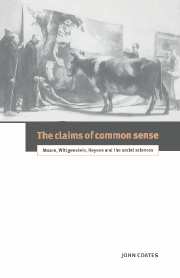Book contents
- Frontmatter
- Contents
- Preface
- Introduction
- 1 A short history of common sense
- 2 Ideal languages and vague concepts: the transition in Cambridge philosophy
- 3 Keynes and Moore's common sense
- 4 Keynes's later views on vagueness and definition
- 5 Samples, generalizations, and ideal types
- 6 The Cambridge philosophical community
- Conclusion: complexity, vagueness, and rhetoric
- Index
- Frontmatter
- Contents
- Preface
- Introduction
- 1 A short history of common sense
- 2 Ideal languages and vague concepts: the transition in Cambridge philosophy
- 3 Keynes and Moore's common sense
- 4 Keynes's later views on vagueness and definition
- 5 Samples, generalizations, and ideal types
- 6 The Cambridge philosophical community
- Conclusion: complexity, vagueness, and rhetoric
- Index
Summary
Philosophical talk of common sense involves us in a contradiction. The notion points to an inchoate body of beliefs which form the background to our intellectual activities, both high and low. This inherited wisdom is commonly seen as the first line of defense against cranks, and the counter-intuitiveness of new ideas is considered a valued spur to further scrutiny. Common sense is like the loyal opposition in parliamentary democracies – annoying in its constant criticism and in the inertia it adds to the intellectual enterprise, yet important over the long haul in catching unnoticed error. This is, one might say, the common sense understanding of common sense. But philosophy traditionally has attempted to bring our intellectual activities within the purview of a transparent rationality, with the goal usually of improving the idioms if not the content of these activities; and a realm of inchoate and inertial beliefs has been anathema to that project. Perhaps that is why historically philosophers have been so impatient in listening to the claims which common sense has in formulating and justifying our beliefs; next to Plato's or Descartes's ideal knowledge it merited as little respect as folklore. This was certainly the reaction of many when the concept was made a philosophical term of trade. Thomas Reid, for example, and later G. E. Moore, took common sense to consist of a body of indubitable and natural beliefs, and on the basis of this view argued that the skeptical conclusions implied by empiricist epistemology were parasitic upon the forms of belief it doubts.
- Type
- Chapter
- Information
- The Claims of Common SenseMoore, Wittgenstein, Keynes and the Social Sciences, pp. 1 - 13Publisher: Cambridge University PressPrint publication year: 1996



